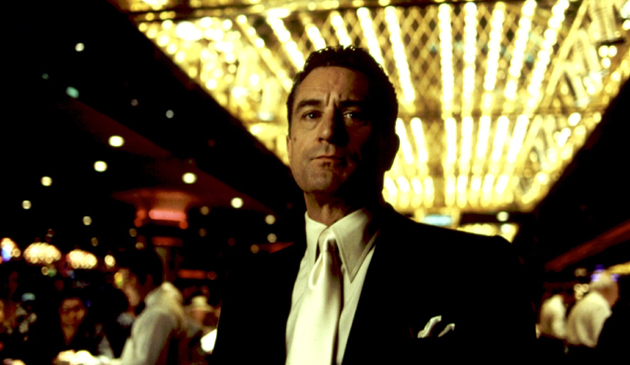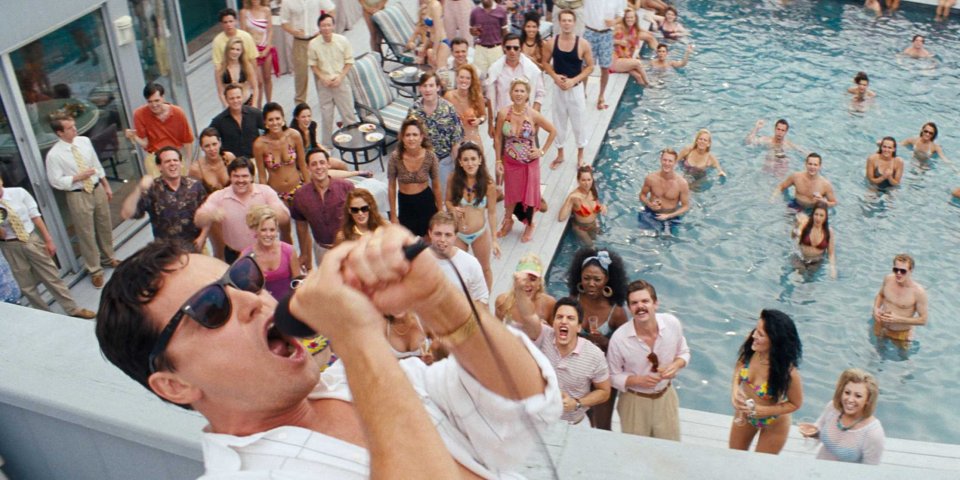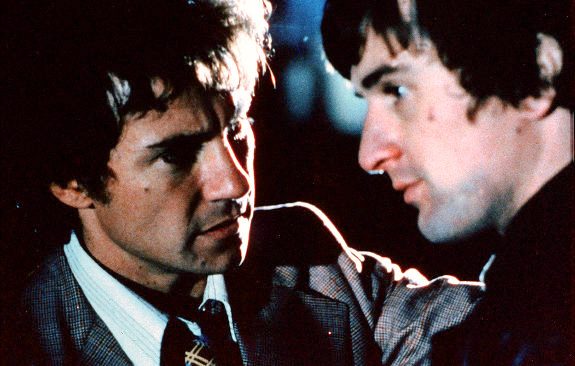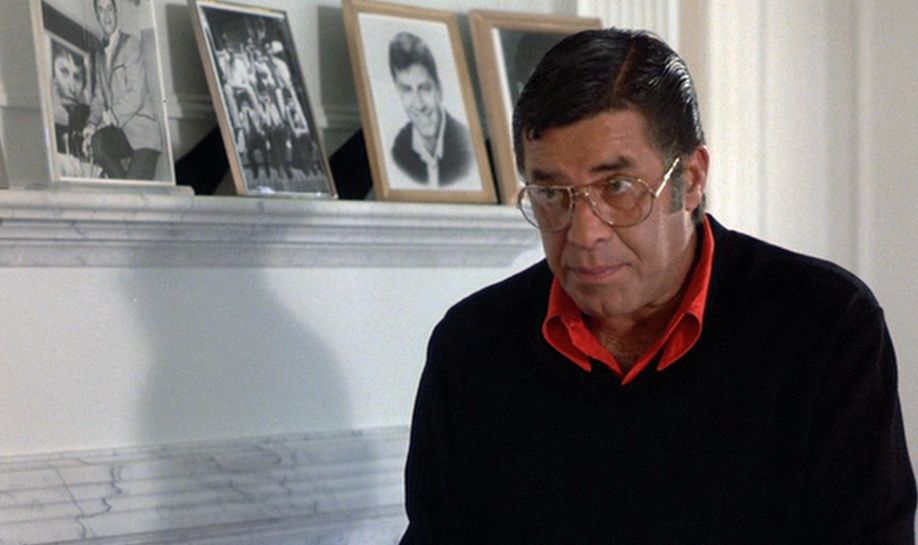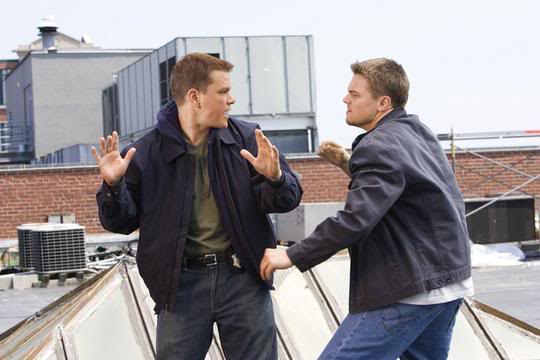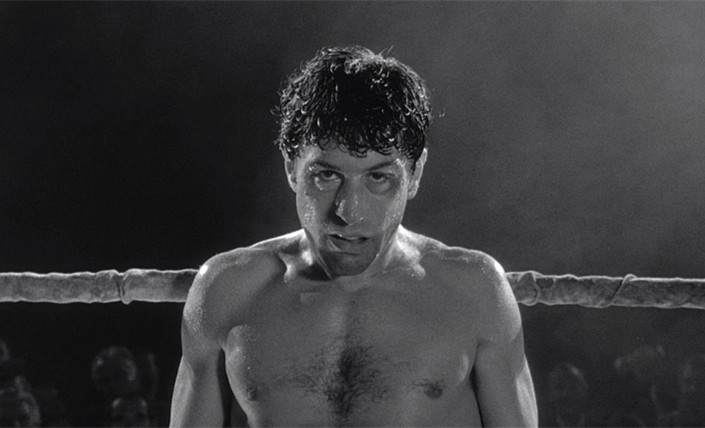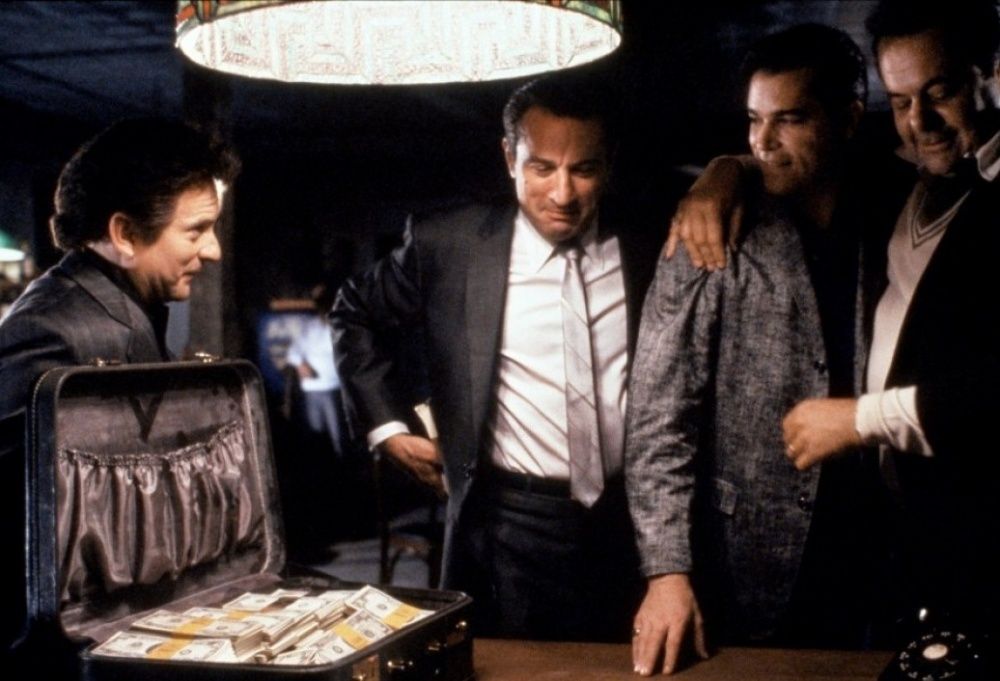8. Casino (1995)
A companion piece to Goodfellas, Casino boasts one of the most unexpectedly brilliant performances of Sharon Stone’s career, a head-on confrontation between Robert DeNiro’s and Joe Pesci’s screen personas, a stylistic bric-a-brac unprecedented in Scorsese’s oeuvre and some truly heavy use of the F-word (422 times!). The plot is centered around and narrated by Sam ’Ace’ Rothstein, who goes up in flames in his silver Eldorado right in the opening shot. He is a Jew from the East Coast who started as a brilliant handicapper for the Mob and made it big in Las Vegas as a casino owner.
During the 3-hour movie his main concerns beside running the casino are his combustible partner Nicky Santoro (Joe Pesci) and gold-digging hustler Ginger McKenna whom he marries in a highly unsuitable arrangement. The atmosphere of a true crime thriller, mainly due to Nicholas Pileggi’s inside man script, the gritty details about the workings of a casino and the icy violence doesn’t quite match the operatic qualities of ’Goodfellas’.
7. The Wolf of Wall Street (2013)
A savage, ironic indictment of the greed of corporate America, especially Wall Street, the film was surrounded by much unnecessary controversy due to the fact that many critics mistake depicting for endorsing, or even glamorizing. By insisting on the extreme debauchery of Jordan Belfort (Leonardo DiCaprio in a fine comedic turn), his clownish sidekick Donnie (Jonah Hill) and his whole entourage of penny stockbrokers grown fabulously rich, the movie just tries to show to whole reprehensible mindset that led to so much economic trouble in the past years. Even the real-life Jordan Belfort admitted that it was much worse in reality.
The witty, rambunctious script was written by none other than Terence Winter, the creator of The Sopranos. The infamous Quaaludes overdose scene has DiCaprio perform a comedic counterpart of his cold turkey sequence in ‘The Basketball Diaries’. The movie is a whole lot of dark, dirty fun if injected with a sense of irony.
6. Mean Streets (1973)
An influential, naturalistic, gritty movie about growing up to be a gangster, it went on to become one of the most seminal gangster movies, a stylistic and conceptual counterpart to the epic, glamorizing and mythologizing Godfather films. It is Scorsese’s most personal, most Catholic film (he grew up in Little Italy, its location, and dreamed of becoming a priest). Charlie (Harvey Keitel), with his guilt complexes, suppressed urges and moral ambiguities, is probably as close as it gets to the director’s youthful alter ego. He tries to navigate the familiar world of small-time mobsters and to save his violent and uncontrollable friend Johnny Boy (Robert DeNiro in his breakthrough role) from himself.
The film’s patient observation of the daily minutiae of their mostly tedious lives, their horsing around and flirting is interrupted by sudden outbursts of violence, choreographed as clumsy, boyish brawls. Its originality and vividness make it one of the most personal gangster movies ever.
5. The King of Comedy (1982)
Perhaps the most understated and subtle movie of Scorsese’s distinguished career, this brilliant cultural satire rests firmly on the actor’s fabulously idiosyncratic performances and Paul Zimmerman’s expert script. Jerry Lewis, for once shedding his nerdy comedian shtick, plays Jerry Langford, a Johnny Carson/Jay Leno-type television host. One of the many nightly hangers-on in front of his studio is Rupert Pupkin (Robert DeNiro) an obsessive fan, aspiring comedian and a better dressed and somewhat less menacing counter-part to Taxi Driver’s Travis Bickle. He somehow manages to get a promise of a shot to fame from an exasperated Jerry.
Pupkin then proceeds to harrass him daily at his office. In this he is accompanied by fellow loony groupie Masha (Sandra Bernhard) and driven by the perspective of making it big and impressing his high school crush Rita (Diahnne Abbott, then Robert DeNiro’s real-life wife). A scathing portrait of the psychopathology of America’s obsession with celebrity, it is one of Scorsese’s most original masterpieces.
4. The Departed (2006)
Featuring a legendary ensemble cast, this loose, much better remake of Hong Kong crime drama ‘Infernal Affairs’, sees Scorsese return to gut-punching form as the master of the gangster movie. Set in Boston as opposed to the usual New York the movie features different kinds of gangsters, is set in a different, more rarefied environment.
The plot is Shakespearean in scope, dominated by its central symmetry: we have two moles, Billy Costigan (Leonardo DiCaprio), a fresh-faced but bleary-eyed cop who infiltrates Frank Costello’s (an unhinged Jack Nicholson) criminal empire and wily criminal Collin Sullivan, who has managed to rise up in the police hierarchy. The interplay between the moles and Nicholson’s towering performance are enough to keep anybody on the edge of their seat for two and a half hours of movie extravaganza.
3. Raging Bull (1980)
The best boxing movie ever made offers a stark, uncompromising portrait of deeply flawed man and great boxer Jake LaMotta (Robert DeNiro), functioning as the complete opposite of popular boxing movies such as ‘Rocky’. LaMotta’s ability to handle the punches inside the ring is matched only by his incapability to deal with the demands of domestic life. Constantly bickering with his brother Joey (Joe Pesci in a relatively subdued performance), he finally manages to free himself from a spouse who has lost patience with his demands and transgressions. He promptly meets the love of his life, nubile Vickie whom he marries after brief courtship. Perpetual winner in the ring, he is nagged by paranoia and jealousy and tries to go it alone in a boxing world dominated by the mob’s vested interests.
A study in working class ethics and extreme machismo, the movie keeps its distance from its anti-hero through Scorsese’s masterful direction. Other obvious strong points are its French New Wave stylistic borrowings, exquisite and hypnotic cinema verité black and white cinematography by Michael Chapman and Robert De Niro’s unmatched immersion in his character for which he won an Oscar.
2. GoodFellas (1990)
This quintessential American gangster movie remains unsurpassed in its interweaving of a top-notch script based on Nicholas Pileggi’s book, mostly career best performances by the cast (especially Ray Liotta’s as Henry Hill, narrator and focus of the story and the scene stealing, Oscar-winning Joe Pesci as manic thug Tommy DeVito, but also Robert DeNiro’s sly turn as strongman Jimmy Conway) dazzling photography (especially the legendary ‘Copa’ shot) and pumping soundtrack.
In a nutshell, the movie is the story of Henry Hill who “always wanted to be a gangster” but ends up part of the FBI witness protection program and gets to live the life of a “schnook” after decades of heists, carjackings, murders, jail time and drug-fuelled car chases, surrounded by mobsters and hitmen, and supported as much as possible by his complying wife Karen (Lorraine Bracco). Everything has to come to an end eventually, but luckily for the viewer, The Sopranos, arguably the best drama series of all time, revisits and explores this world in much more detail.
1. Taxi Driver (1976)
On 15th May 1972, Arthur Bremer shot presidential candidate George Wallace five times following a speech, leaving Wallace paralyzed. His diaries were serialized in a newspaper and read by screenwriter Paul Schrader, a young man who, in his early twenties, found himself divorced, out of work and living in his car. Then the script to Taxi Driver “jumped out of his head like an animal”. Then again on 30th March 1981, President Ronald Reagan was shot twice by 26 year old John Hinkley Jr. At his trial his defense pleaded insanity on account of the fact that he claimed to have lost his identity to Travis Bickle, the character played by Robert DeNiro in the movie.
This strange and unfortunate chain of events goes to show what deep plunge this movie took right inside the underbelly of America, slowly pulling out its dark innards. It works as one of the most intense studies of alienation ever committed to film, as a profound insight into the mind of a psychopath or a cry of despair at the multiple failures of the idealistic tribes of America’s counterculture. The dim glimmer of hope it offers turns out to be a misunderstanding.
Author Bio: Alex Nasaudean is an English teacher from Romania, currently working in China. A long-time movie addict, his favorite directors include David Lynch, Martin Scorsese, Michael Haneke, Takeshi Kitano etc.
